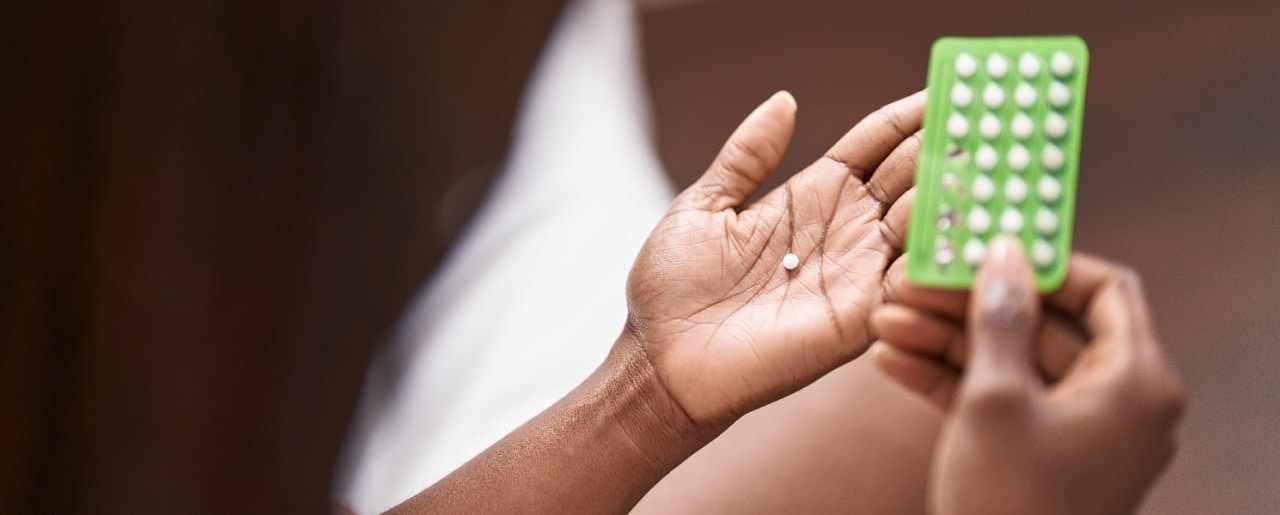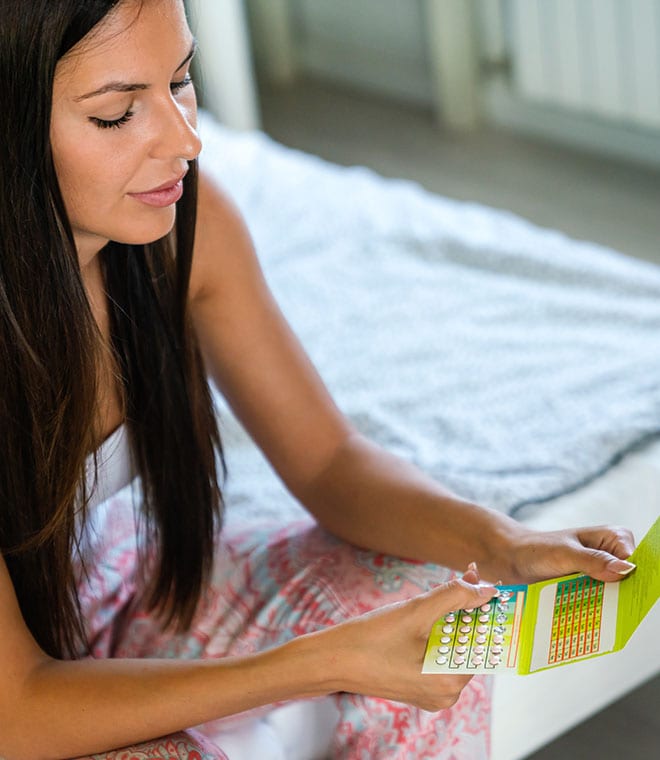Health
Can you get your period on birth control?
By Patricia Ann Convery, MD, Fellow, American College of Obstetrics and Gynecology Jul 21, 2023 • 7 min
Birth control containing hormones can reduce the risk of becoming pregnant during sexual intercourse, and it may also impact your menstrual cycle. Many women considering birth control wonder whether they’ll still get their period. The answer is that it depends on a number of factors, including which type of hormonal birth control you use, how you use it and how your body responds to it.
Some women do get their periods while on birth control while others don’t. The type of hormonal birth control is one of the biggest determining factors.
Oral contraceptives
Many people refer to oral contraceptives as birth control pills. Traditional combination oral contraceptives come in a pack of 28. The pills must be taken in order, according to the day labeled on the package. The first 21 pills contain the hormones estrogen and progestin, while the last seven pills are typically hormone-free placebos. During the last week of the 28-day pill pack, most women will get their periods.
Over the years, new birth control pills have been introduced to the market with alternative regimens and variations. Some have 24 active pills instead of 21. Some women choose to skip their placebo pill and take the hormone pills continuously in order to skip their periods.
Ninety-one day packs are also available. These packs provide 12 weeks of hormone pills and one week of nonhormone pills. These birth control pills typically result in a period only once every three months.
Some women take progestin-only birth control pills, often due to medical contraindications to estrogen. The typical progestin-only pill has no placebo pills. The progestin-only pill can make some women have irregular spotting or bleeding initially. However, their periods will typically get lighter or stop over time.
If you are interested in getting a birth control prescription, check out Walgreens Virtual Healthcare where you can get birth control prescribed online.
Patch contraceptive
The birth control patch, or patch contraceptive, releases hormones that get absorbed through the skin. The traditional regimen is one patch per week for three weeks and then seven days off. During the off-week, you’ll typically have your menstrual period.
Women who want to stop their periods may choose to skip the patch-off week and continuously apply a new patch weekly. If you take this approach, you may still experience some menstrual bleeding and spotting during the first six months of using the patch.
Vaginal ring
A contraceptive vaginal ring is a flexible, small ring that you wear inside of your vagina. It slowly releases hormones that then get absorbed through the lining of the vagina.
Typically, you wear the ring continuously for three weeks and then remove it for one week. During the off week, you’ll typically menstruate. Then, you insert a new ring.
Women who prefer not to have periods may choose to wear the ring for three weeks and then replace it. In some cases, if you want to prevent menstruation, it may be possible to use one ring for a longer period, such as four weeks, before replacing it. However, you should talk to your healthcare provider about which replacement schedule is best for the specific type of vaginal ring you use.
Birth control implant
The birth control implant is a rod-shaped object measuring about 1.6 inches in length. A healthcare provider injects the implant into your upper arm using a needle-like device. Once in place, the implant releases hormones for up to three years.
Many women experience irregular menstrual bleeding for the first six to 12 months of implantation. The implant may make periods lighter or prevent them from occurring altogether.
Birth control shot
The birth control shot, or Depo-Provera, is a hormone injection that you typically receive once every three months. If you choose the birth control shot as your contraceptive, your periods may become irregular or stop completely.
Depo-Provera is not an ideal method of birth control for everyone. Women who have certain health conditions, including heart disease, lupus and liver disease, may need to consider other birth control options.
Intrauterine device (IUD)
An intrauterine device, or IUD, is a small insert that a healthcare provider places inside of your uterus. There are two types: copper and hormonal.
Copper IUDs work by triggering an inflammatory response that prevents a fertilized egg from becoming implanted in the uterine lining, preventing pregnancy. Normally, copper IUDs don’t stop periods. In fact, they can actually make bleeding heavier during the first few months after insertion.
Hormonal IUDs release small amounts of the hormone levonorgestrel to prevent pregnancy. With this type of IUD, your periods will typically become lighter, possibly irregular, or even stop altogether.
Controlling menstruation with birth control
Although the primary purpose of birth control is to prevent pregnancy, some women use birth control methods to control the timing of their periods, manage symptoms of PMS (premenstrual syndrome) or stop their periods entirely. If you’re looking for a form of birth control that will allow you to have fewer or no periods, talk to your healthcare provider. They can help you weigh the available options, explain their side effects and give you advice on which type is right for you. When you do get your period, there are many different feminine care products as well as menstrual pain relief products available to help make the situation more manageable.
Published July 2023.
Sources:
- https://my.clevelandclinic.org/health/articles/24564-contraceptive-implant
- https://my.clevelandclinic.org/health/articles/24490-birth-control-patch
- https://www.mayoclinic.org/healthy-lifestyle/birth-control/in-depth/birth-control-pill/art-20045136
- https://www.plannedparenthood.org/learn/birth-control/birth-control-shot
- https://my.clevelandclinic.org/health/drugs/4086-depo-provera-birth-control-shot
- https://www.plannedparenthood.org/learn/birth-control/birth-control-pill/how-do-i-use-the-birth-control-pill
- https://my.clevelandclinic.org/health/treatments/24441-intrauterine-device-iud
- https://www.plannedparenthood.org/blog/i-use-nuvaring-and-ive-heard-you-can-use-it-continuously-to-keep-from-getting-your-period-how-does-that-work
- https://my.clevelandclinic.org/health/articles/24157-vaginal-ring
- https://www.plannedparenthood.org/learn/birth-control/birth-control-vaginal-ring-nuvaring/what-are-benefits-nuvaring
- https://www.plannedparenthood.org/learn/birth-control/birth-control-implant-nexplanon/what-are-the-disadvantages-of-birth-control-implant
- https://www.plannedparenthood.org/blog/what-happens-if-you-wear-a-patch-on-your-off-week
- https://www.mayoclinic.org/tests-procedures/minipill/about/pac-20388306




